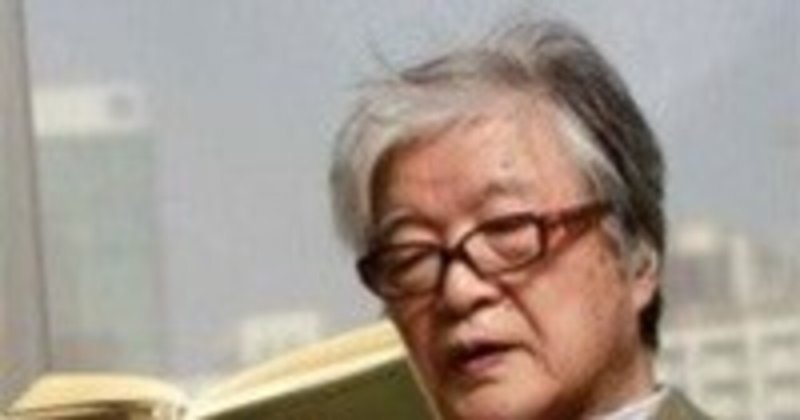
「書物の達人」丸谷才一(まるやさいいち)(英語対訳)8 “A Master of Books” Maruya Saiichi (Japanese-English Translation) 8
「書物の達人」丸谷才一(まるやさいいち)(英語対訳)8
(8)書評文化の確立
毎日新聞が一九九二年に書評欄の大刷新を行った際、同社の委嘱により顧問に就任。企画段階から深くかかわり、特色ある紙面づくりに寄与。同顧問は二〇〇一年に辞しました。書評を文芸の一つに見なす主張をし、毎日書評賞を発足させました。
書評の重要性を唱え、「質の高い読み物」としての書評文化の確立に貢献した丸谷才一は、毎日新聞書評欄「今週の本棚」に、イギリスの書評ジャーナリズムに親しみはぐくんだ「新聞書評の理想」を惜しみなく注ぎ込みました。
「書評はそれ自体、優れた読み物でなければならない」との信念に基づいた紙面作りは、「程度の高い案内者が、本の内容を要約して読者への道案内をする」新しい書評となって結実しました。
書評の分量を最大で原稿用紙五枚(二千字)に大幅拡充したほか、書評執筆者名を書名や著者名の前に掲げ、各界の一流の書き手が責任をもって本を紹介、評論するスタイルを確立しました。この「今週の本棚」は各紙書評欄にも影響を与え、丸谷才一の理想によって、日本の新聞書評全体が革命的な進化を遂げたといえます。『毎日新聞「今週の本棚」 二十年名作選』全三巻、丸谷才一・池澤夏樹共編(毎日新聞社、二〇一二、五~二〇一二、十一)があります。二〇〇二年には、書評をまとめた本を対象とする初めての賞「毎日書評賞」の創設にかかわり、常に本を愛し、大切に思い続けた作家、文学者でした。このため「書物の達人」とも言われました。丸谷と親交が深かった各界の第一人者たちの論考『書物の達人 丸谷才一』(集英社新書)があるほどです。
丸谷才一は「今週の本棚」に「二〇年 和田誠さんに感謝」(二〇一二年五月三十日 東京朝刊)にこう書いています。
「毎日新聞「今週の本棚」の顧問を二十年近くつづけることができたのは、和田誠さんのおかげだった。彼の助けがなかったら、これだけの成功はあり得なかったろう。当時編集局長だった斎藤明さんから、「今週の本棚」をすべて任せるからやってくれと言われたとき、一番心配したのは、日本の大新聞の書評欄につきものの、あの辛気くさい、陰惨な感じをどれだけ払拭(ふっしょく)できるかということだった。書評それ自体には自信があった。わたしがイギリス書評から学びつづけ、日本の書評を批判しつづけた長い体験、そしてわたしの評価する筆者たちの力量とわたしの方針に対する理解力をもってすれば、ほとんどすべてが好読物になるに決っている。それは確
実だった。
しかし何しろ新聞三ページにわたる長さだし、書評欄とはこういうものだという日本ジャーナリズムの伝統的な思い込みがある。それを破壊するには大才の協力を必要とする。そこでわたしは和田さんに頼んで、いっしょに「今週の本棚」を作ってもらうことにした。その結果、彼の時代感覚、明るいユーモア、鋭い知性、いや、まず何よりも彼自身が本好きの読書人であるという条件によって、「私の三冊」のイラストの、三ページ全体の表紙ともいうべき花やかな効果から、紙面総体の都市的デザインまで、わたしの狙いをしのぐ見事な成果をあげることになった。」(「今週の本棚」)
芥川賞、谷崎潤一郎賞や読売文学賞、毎日書評賞などの選考委員を長年にわたり勤めました。村上春樹の才能を早くから見いだし、村上のデビュー作『風の歌を聴け』を群像新人文学賞において激賞。また、受賞はしなかったが芥川賞の選考においても村上を強く推しました。
“A Master of Books” Maruya Saiichi (Japanese-English Translation) 8
(8) Establishment of Book Review Culture
When the Mainichi Shimbun Newspaper carried out a major overhaul of its book review column in 1992, he was appointed as an advisor by the company. He was deeply involved in the planning stage and contributed to the creation of a distinctive paper. He resigned from the advisor in 2001. He advocated viewing book reviews as a form of literary art and established the Mainichi Book Review Award.
Maruya Saiichi, who advocated the importance of book reviews and contributed to the establishment of a culture of book reviews as ``high-quality reading materials,'' wrote ``Newspaper Book Reviews'' in ``This Week's Bookshelf'' in the Mainichi Shimbun Book Review column, which fostered familiarity with British book review journalism. We generously poured in our ideals.
The paper is created based on the belief that ``a book review must be an excellent read in itself,'' and a new type of book review in which ``a highly qualified guide summarizes the content of the book and guides the reader.'' It has come to fruition.
In addition to significantly expanding the size of book reviews to a maximum of five manuscript sheets (2,000 characters), the name of the book review writer is placed in front of the book title and author's name, and a style in which first-class writers from various fields take responsibility for introducing and reviewing books. has been established. This week's bookshelf had an impact on the book review sections of each newspaper, and it can be said that Maruya Saiichi's ideals led to a revolutionary evolution of Japanese newspaper book reviews as a whole. There is a total of three volumes of ``Mainichi Shimbun ``This Week's Bookshelf'' 20 Years of Masterpieces'', co-edited by Maruya Saiichi and Natsuki Ikezawa (Mainichi Shimbun, 2012, 5-2012, 11). In 2002, he was involved in the establishment of the ``Mainichi Book Review Award,'' the first award for books that are a collection of book reviews. He was a writer and literary scholar who always loved and cherished books. For this reason, he was also called the ``Master of Books''. There is even an essay titled ``A Book Master Maruya Saiichi'' (Shueisha Shinsho) written by leading figures in various fields who were close friends with Maruya.
Maruya Saiichi wrote the following in ``This Week's Bookshelf'': ``20 Years of Thanks to Makoto Wada'' (May 30, 2012, Tokyo Morning Edition).
``The person who was able to continue as an advisor for Mainichi Shimbun's ``This Week's Bookshelf'' for nearly 20 years is Makoto Wada.
It was all thanks to you. Without his help, this success would not have been possible. Mr. Akira Saito, who was the Editor-in-Chief at the time, told me that he would be in charge of all ``This Week's Bookshelves.''
When I was asked to give it to them, what I was most worried about was the usual book review sections of major Japanese newspapers.
The question was how far I could get rid of that bitter, gloomy feeling. book review itself.
I was confident in my body. I continue to learn from British book reviews and criticize Japanese book reviews.
My long experience, the ability of the authors I evaluate, and my policy.
If you have a good understanding, almost everything will be a good read. That is certain
It was true.
However, it is three pages long in a newspaper, and this is what a book review column is supposed to be like.
There is a traditional belief in Japanese journalism. To destroy it, we need the cooperation of a great talent.
I need him. So I asked Mr. Wada to create a ``This Week's Bookshelf'' together.
I decided to get it. As a result, his sense of the times, his bright humor, his sharp intellect...
First of all, because he is a bookworm, he is inspired by the flowery effect of the last illustration of "My Three Books," which can be called the cover of the entire three pages, and the urban design of the entire page. So far, the results have been spectacular, exceeding my expectations. ” (“This Week’s Bookshelf”)
For many years, he served on the selection committee for the Akutagawa Prize, the Tanizaki Junichiro Prize, the Yomiuri Literary Award, and the Mainichi Book Review Award. Mr. Haruki Murakami's talent was discovered early on, and Mr. Murakami's debut novel ``Hear the Wind Sing'' was highly praised at the Gunzo Prize for New Writers. Also, although he did not win the award, he strongly recommended Mr. Murakami in the selection process for the Akutagawa Prize. (To be continued)
この記事が気に入ったらサポートをしてみませんか?
